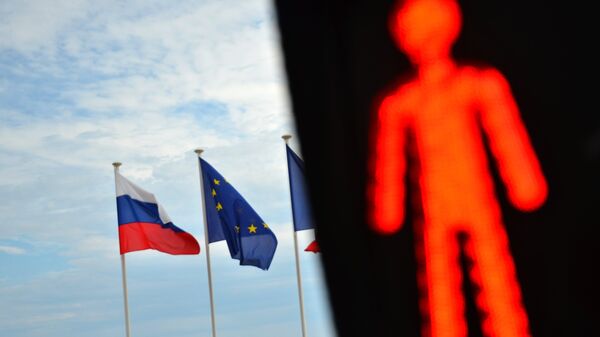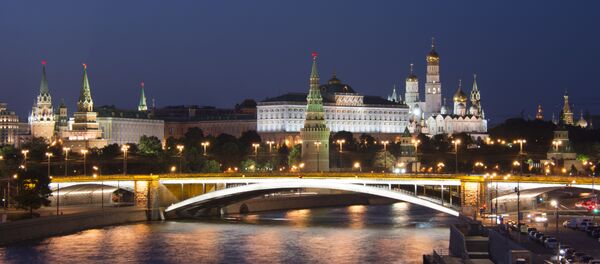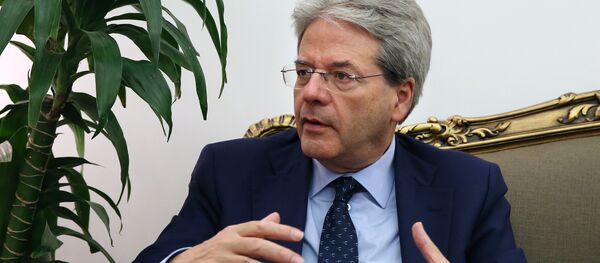MOSCOW (Sputnik) — The draft bill comes as the European Council is scheduled to debate another extension of the economic sanctions against Russia, first imposed over Ukraine crisis in July 2014 and due to expire on January 31.
The draft resolution, which has been seen by Sputnik, lists the reasons why the sanctions should not be maintained any longer, and the harm these economic measures have done to France.
Sanctions harm Moscow-Paris relations
The draft notes that in recent years, Russia and France had enhanced their bilateral cooperation on a wide range of issues, but due to the 2014 sanctions and their subsequent extensions, bilateral cooperation has been damaged on multiple fronts.
"Bilateral trade has in fact declined. Since the beginning of 2015, the volume of Franco-Russian trade has declined by 40 percent, to a large extent due to the non-delivery of the Mistral warships. The cancellation of the sale of the Mistrals to Russia illustrated the abandonment of our national independence. This political mistake also has a considerable cost to French taxpayers," the document reads.
According to the draft resolution, the anti-Russia sanctions "contradict the fundamental interests of French-Russian relations," and are "totally ineffective and mostly illegal in terms of international law and harmful to the interests of France."
Moreover, small and medium French companies seeking to expand their presence in Russia have struggled to find financial support, and a number of joint or exchange projects have been stopped or postponed since the sanctions were imposed on Moscow.
"These sanctions, which will only push the Russians to reorient their trade, are detrimental to sustainable economic relations between France and Russia. If the sanctions last any longer, French companies will end up suffering more than Russia," the document warns.
The financial impact of the sanctions, both on the European Union and on France in particular, should be evaluated "with great realism" before a decision to extend the restrictive measures is made, the resolution underlines.
Legal ground for sanctions is questionable
The French resolution also questions the legality of the European Union's decision to impose individual sanctions against Russia.
"Such sanctions raise a series of questions, especially regarding the legality of such measures. Indeed, who can claim the right to create a list of citizens and applying personal sanctions against them without questioning, without having an opportunity to defend themselves and even have a lawyer," the document reads.
The resolution argues that the EU sanctions are not compatible with Article 6 of the European Convention on Human Rights concerning the right to a fair trial for violations of civil law.
Moreover, the fact that the EU decision was taken by an executive and not a judicial body, means that the decision violates the rights of the people on the list, because they had no way to appeal it.
Anti-terror fight and anti-Moscow sanctions are incompatible
According to Mariani's resolution, the global fight against terrorism, particularly against the Islamic State (IS, or Daesh in Arabic) jihadist group, banned in Russia, cannot be properly coordinated and effective as long as the anti-Russia sanctions remain in place.
"Taking into account the geopolitical context and the urgent need to fight Islamic State together with Russia, maintaining economic sanctions against the Russian Federation has lost its relevance….. Indeed, we cannot ask Russia to be a partner in the fight against Daesh and simultaneously continue to impose sanctions against it," the resolution reads.
The document highlights the fact that Russia and France are already coordinating their aerial counter-terrorism offensives in Syria, and such a move underlines the need to "raise the issue" of lifting the sanctions.
Since September 30, Moscow has been conducting precision airstrikes on terrorists positions in Syria, following a request from President Bashar Assad. Meanwhile, France is participating in an international, US-led anti-terrorist coalition, which has been battling extremists in Syria and Iraq since 2014.
In the wake of the November 13 Paris attacks, France has boosted its anti-terror measures, in particular, enlarging its role in the US-led coalition and moving to coordinate its airstrikes with Moscow.





